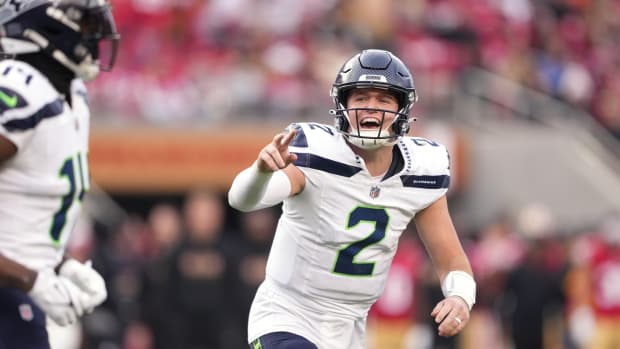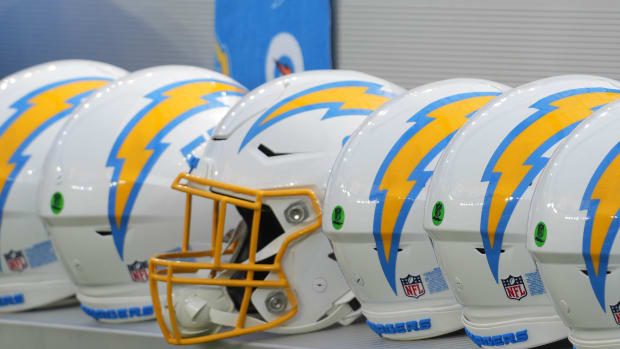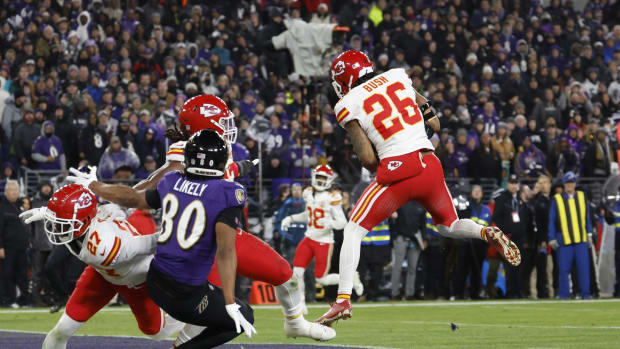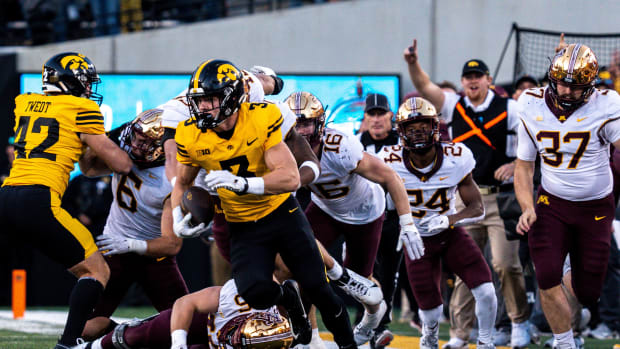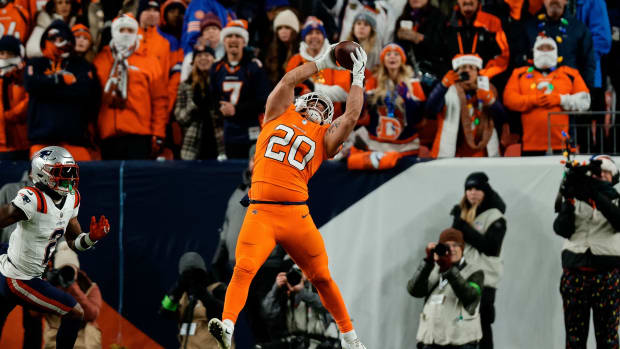Many approaches during General Managers' Week, but which is right?
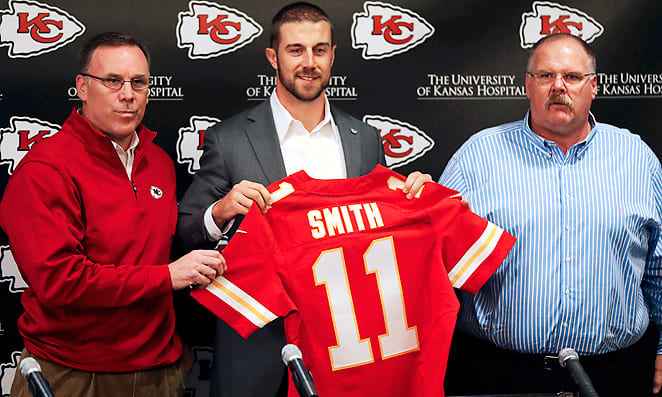
First-year GM John Dorsey and the Chiefs traded for Alex Smith before free agency, but didn't stop there.
Orlin Wagner/AP
PHOENIX -- There's one week a year that I think of as the General Managers' Week, and we've reached the end of it. The first week of free agency highlights the different jobs general managers have in the league, and what I've done here at the annual spring meetings is talk to five I view as being indicative of the profile that franchise football operators fill at this time of year. I've chosen Green Bay's Ted Thompson, Philadelphia's Howie Roseman, Seattle's John Schneider, Kansas City rookie John Dorsey and Miami's Jeff Ireland as an illustration of what the 32 teams have to think about at this time of year.
One at a time, here are the jobs they faced over the past week, and how I think they did:
John Schneider: Letting the market come to him.
"We never say, 'We're not going to do this.' "
I wrote yesterday in my Monday column about how, a week and a half ago, Schneider didn't envision having either Percy Harvin, Cliff Avril or Michael Bennett on his roster. And they all are there now. "Sometimes the landscape changes, and it certainly did this year,'' Schneider said.
When Schneider was first approached about trading for Harvin, he said no. Not just no -- absolutely no. The Seahawks have safeties Kam Chancellor and Earl Thomas to try to sign, and then cornerback Richard Sherman, and later quarterback Russell Wilson. Schneider knew Harvin wanted huge money -- Larry Fitzgerald money -- and that was a nonstarter. But Schneider investigated Harvin, and got to believing that his problems in Minnesota stemmed from a bad relationship with the former coach, Brad Childress, that could never be forgotten, as well as the Vikings' refusal to pay him market value for the receiver position. And Schneider learned Harvin might play for Vincent Jackson ($11 million a year) money, and he started to get interested.
The price was heavy -- first-, third- and seventh-round picks -- but at the end of the day, Schneider asked himself if he could get a player with the 25th pick in the draft that could approximate Harvin's value, and asked himself if he could live with the consequences in a flat-cap era of taking on a contract with a cap fee of $10 million or so per year, with all the deals he had to sign. And did he trust Harvin to stay healthy?
It's a risky business, being a GM, and Schneider thought back to his days working under Ron Wolf in Green Bay. Wolf's first act as GM of the Packers in 1992 was to trade a first-round pick to Atlanta for an overweight quarterback who drank too much as a rookie, Brett Favre. "Ron had courage to take a chance when he felt it was right. Brett, Keith Jackson, Reggie White. He trusted his judgment, and he never got too dug in,'' said Schneider.
Avril (two years, $13 million) and Bennett (one year, $5 million) are about the easiest calls Schneider ever had to make. They were among the top five quarterback-pressure guys on the market, and to get them for $8.75 million on the 2013 cap ... that's a deal you make with your eyes closed.
I asked Schneider if he felt he had to keep up with San Francisco in a kind of NFC West arms race. "No,'' he said. "We're not making moves based on the 49ers">49ers. We're just trying to build the best team, regardless of our division."
Howie Roseman: Learning a new landscape.
"It's hard to bring inguys at bigger money than your players and say it's not going to create a problem."
Two years ago, the Eagles brought in some big-money guys. Nnamdi Asomugha, Cullen Jenkins, Jason Babin. The Dream Team. Soon it was The Nightmare Team.
Now, Roseman is running the show -- Andy Reid, his godfather, and former boss Joe Banner are in the AFC after a disastrous 2012 -- and he was determined to do two things here: get new coach Chip Kelly the players he wanted, and not overpay them. With tight end Brent Celek in the midst of a six-year, $33 milion deal, Roseman was going after the versatile tight end of his dreams, James Casey. But only if the money was right. And it was: three years, $12 million, just $4.02 million in the first year. "Chip took a look at the free-agent tight end tape,'' said Roseman, "and he took one look at Casey, and that was his guy." Same with his other signings -- Connor Barwin couldn't be over Trent Cole, etc.
BURKE: Grading free agency's biggest signings
"It's a team sport, and there are chemistry issues,'' he said. "I like our guys this year because none of them are at the top of the market, they are blue-collar players, and they fit what our coaches want to do. I think what I learned from the 2011 team is football's the ultimate team sport, and you start looking at the difficulty we had that year, and we entered the year thinking, 'We're this close. Is this the moment we get aggressive and take our shot?' It was.''
Now Roseman has to learn what Kelly likes. Kelly has to learn to trust Roseman and the scouts. The players have to learn how Kelly likes to practice. (Which, by the way, is fast.) And the general manager has to learn a new boss. The chemistry experiment is off to a good start, but Roseman knows March isn't the time to make judgments on anything.
John Dorsey: A rookie who doesn't have time to be a rookie.
"You see the bottom drop out of the market, and you react."
It wasn't the trade for Alex Smith, which seemed easy even though the pricetag (a second-round pick this year, and another high pick next year) was high, or the signing of backup quarterback Chase Daniel to give the Chiefs good quarterbacks at first- and second-string. Nor was it the decision to sign Dwayne Bowe to franchise receiver money, or to franchise left tackle Branden Albert. It was stretching to get 6-foot-3 cornerback Sean Smith from Miami, when the cornerback market was crashing and Dorsey didn't have much time to decide what was right or wrong.
"We had decided we were going to address free agency, but in a frugal way, after we signed our own guys,'' Dorsey said. "One of the things I've learned is it's not smart to go what I call the JUCO route, taking players who might be only short-term fits. We want to take guys at reasonable prices who can be core players. When the corner market changed, we really had to go after Sean.''
To clinch the deal, Dorsey paid $7.5 million in year one, which means Smith won't be a one-year fix; he'll be a relative bargain at $3.5 million in year two.
I like the fact that both Reid and Dorsey think Alex Smith throws the ball well enough downfield to commit to him. He doesn't have a top-10 arm in the league, nor a top-15. But he's certainly good enough. "We looked at every plus-10 throw he made in the last two years with the Niners,'' said Dorsey, meaning every throw that traveled more than 10 yards past the line of scrimmage. "And we liked what we saw. He's got enough arm to win in this league; there's no doubt in my mind. He can throw the 20-yard comeback from the opposite hashmark and hit his target. And he knows when to take a shot and when not to.''
That's a shot Dorsey and Reid have taken, and I think they'll be rewarded for it.
BANKS: Five non-playoff teams who did the best job in free agency
Jeff Ireland: Finally a player in the March game.
"I've sat on the sideline for five years in freeagency. I'm glad I finally got to make a move."
Cap money and major need. That marriage fit the embattled Ireland, and he went out and solidified one of the biggest need positions in the league. He replaced a blocking tight end with some receiving skills, Anthony Fasano, with the offensive Dustin Keller. He got the best deep threat on the market, Pittsburgh wideout Mike Wallace, and another receiver with an inconsistent deep game, Brandon Gibson. And he re-signed possession receiver Brian Hartline. He built a new inside linebacker corps with Dannell Ellerbe and Phillip Wheeler.
He'd better be right. The pressure will be enormous. Wallace will make $27 million in the first two years of his deal, with lots of guarantees, and Ireland committed $7.5 million a year to an inside linebacker, Ellerbe, to convince him to leave Baltimore. Wallace and Ellerbe will take $41 million out of impatient owner Steven Ross' pockets in the next 21 months. That's a gutsy risk by Ireland.
"Were we bidding against ourselves?'' Ireland said to me, repeating the question. "That was a discussion among ourselves at one point. In this case, we had a Plan B, but we didn't like our Plan B. Maybe the criticism is out there that we bid against ourselves, but at the end of the day, I ask myself: Do you want the player? And if the answer is yes, and you can afford, you go get the player."
Ireland went out and got Ryan Tannehill the toys he needed to win. For everyone in Miami, the purchases had better be right.
Ted Thompson: He can afford to be patient.
"I'm not sure I'm very good at this, but it's who I am."
Thompson, in my opinion, has much in common with Baltimore's Ozzie Newsome, the Giants' Jerry Reese and Pittsburgh's Kevin Colbert. None get very excited at the start of free agency. They wait out the early money-grab and wait for value players. It's K-Mart shopping. And who's to argue with them? In the last six seasons, those four general managers have won five Super Bowls.
This year, Thompson made offers to two good free agent players, wideout Greg Jennings and running back Steven Jackson. But the Vikings nabbed Jennings for about 25 percent more than Green Bay wanted to spend. And Atlanta got Jackson. This is a move I think Green Bay will regret. Atlanta is paying $8.25 million in the next two years; I feel pretty certain he'll make it that far with the Falcons. There is no question in my mind that Jackson is worth that for a team that is desperate to run the ball better. Put it another way: Is Jackson worth 2.6 percent of the Packers' salary cap in 2013? I think so. But I'm not the one to make the call.
"Yeah,'' he said to me, "there's always some regret when you don't get to make a deal. You wonder if you did the right thing. Fans get mad at me, and maybe rightfully so. I'm not very comfortable in this setting, and I'm not always the best at dollars and cents.
"But we're big believers in drafting and development. I don't just look at the players who you can acquire. I look at whether we can coach them and make them better, and I have seen over the years how important that is to building a great team. We don't look down our noses at teams that are aggressive in free agency. Not at all. There are many ways to build a good team.
"But over the years, when I look at free agency, I don't see a lot of Reggie Whites getting to free agency. I think for the most part you have to draft and develop great players. But I understand fans. This is a 12-month-a-year business now, and people keep score in free agency. I do it in baseball with my Astros. Overall, we just believe in drafting our own players and developing them, mostly.''
Since 2007, Green Bay is 66-30, with one Super Bowl title. I ran into Reese here Monday and told him about my talk with Thompson, and he nodded. "That's what football is,'' Reese said. "Getting young players and coaching them and developing them.''
In March, that apparent truism doesn't always ring true. We'll see which GM did it right come December.
BURKE: Best of who's left in free agency
***
Now for your email:
GOOD QUESTION, JEFF. "We hear pretty regularly about the high profile guys and their experiences in the first couple of crazy weeks of free agency, but I was wondering what it's like for an average run-of-the-mill guy during that time. Are they pounding the pavement like the rest of us would be if we were out of work, calling a bunch of teams and essentially putting out their resumes, or is it just a matter of waiting for the phone to ring once the "upper tiers" have been accounted for?"
-- Jeff DuBransky, Montclair, Calif.
The players who aren't signed yet -- and there are still scores of them -- have basically been told by their agents to be patient, that this is an odd year for the market, and they'll be somewhere but it might take a few weeks. Only thing is, it's not that odd a year. The cap didn't go up much last year, and it's likely to rise only $2 million or so in 2014. So the players on the sidelines are getting their expectations adjusted downward every day. In most cases, it's agents selling the players to teams waiting for the asking prices to go down. Here at the meetings, I have seen agents Drew Rosenhaus, David Dunn and Frank Bauer trying to stir up business for their unemployed clients (among other business meetings here).
GALLERY: Veterans in need of a team
THE TEAM IS BEFUDDLED TOO. "Love the MMQB column, I have a question regarding the Redskins salary cap violation. I have read many places, including the Washington Post, that technically the Redskins did not break any rules regarding the salary cap issue that that got them into trouble. So, why (if they did not break a rule) are they being penalized? Is it just the NFL does not like Dan Snyder? I am befuddled by the NFL's decision if no rules were broken.''
-- Michael S. Jordan, Williamsburg, Va.
A couple of years before the league had its year without a salary cap in 2010, teams were told to not push money from big-ticket signings into that year. The league ruled that Dallas, Washington, Oakland and New Orleans did push cap money into that year excessively, and penalized all of them for it. No individual contract was red-flagged by the league; it was the combination of the money assigned to 2012 that set off alarms in the league. Looking back, the league certainly should have told each team, "Look, this is permissible by law, but you're treading on dangerous ground here." And the NFL judged that Washington should be docked $18 million a year in 2012 and another $18 million this year ... and the Players Association signed off on the sanctions.
WHAT EXTRA MONEY? "Do you realize that if the Patriots score 100 fewer points without Welker, they still would have been the third highest-scoring team in 2012? On the other hand, if they improve their defense by just 25 points it would have been sixth overall? I love Welker and agree this will be a step back for the New England offense, but the Patriots can afford it if they use the extra money to improve on D.''
-- Eric Moore, Anchorage
Well, the Patriots will not devote a significantly different amount of money to Danny Amendola than they would have Welker, so the money part of this is moot. If you mean they should have spent a couple of extra million on Welker than they would have paid for Amendola, you could turn out to be absolutely right ... but that is dependent on two things: Can a player who has missed 20 games due to injury in the last two seasons produce like Welker? And can the Patriots buy, say, a Dwight Freeney or John Abraham to help that defense?
ANDREW HAS A SINKING FEELING OVER IN IRELAND. "I get the sinking feeling that the Bears feel they have solved their offensive line problems. From what I've read, and seen on the telly, Jermon Bushrod at left tackle is only a marginal improvement over JaMarcus Webb. Hey, I know that ANY improvement with that line is welcome, but do you think Chicago still needs to bolster its O-line? And if so, how realistic is it for the Bears to rely on the draft (considering their selection)? Thanks for the fine column and insights, it always makes my Monday afternoons!''
-- Drew Snyder, Graiguenamanagh, Ireland
Thanks, Drew. Webb was a major liability at left tackle for the past two years. Major. I don't think Bushrod's a top-10 tackle (he's been schooled by some of the quick pass rushers of the NFC South), but he's certainly an improvement. As far as the Chicago priorities, I couldn't agree more with you: I'd draft two offensive linemen in the first three picks if I were GM Phil Emery, almost regardless of the board.
THE LEAGUE HEARS YOU. "Regarding the leading with the helmet rule. If the NFL really wants to be safety conscious and discourage players (offensive or defensive) from leading with their helmets, I suggest the rule should be mandatory removal from game to be tested for a concussion by a league doctor. Only after passing a test and getting cleared can the player re-enter. No need for a penalty. Players do not care about penalties and fines. They care about being on the field. Coaches also want their players on the field and the threat of a player having to sit out while getting concussion tested will motivate them to coach the players differently. After all they are so serious about thigh pads that they threaten to not allow a player on the field without proper thigh pads. You would think they could take leading with the helmet and concussions just as seriously.''
-- David, Marietta, Ga.
But that wouldn't take the helmet hitting out of the game -- assuming it's just a play or two a guy is going to have to miss (and maybe zero, if it's the last play of a series). That's not going to be a deterrent. You are right, however, in thinking of ways to make sure concussed players are tended to quickly. That's going to be done by the league more aggressively this season. Let's see if that works.
JARED DOESN'T LIKE THE CROWN-OF-THE-HELMET RULE. "Unlike most fans, I have been a proponent of these moves towards greater player safety. I have to say, however, that this change regarding running backs lowering their heads is absolutely insane. Running backs take the most vicious hits of any position, and they can take hundreds of hits a year. It's why they have shorter careers. For the NFL to pile on and make it harder for a running back to protect themselves is completely stupid. The NFL is acting like linebackers are dropping like flies due to concussions. That simply isn't the case. If any position on the field deserves more protection -- not less --it is running back.''
-- Jared, Cleveland
Let me give you an example to show why I think you're wrong. Running back in the open field, going toward the goal line. Safety in his way. One step from a collision, running back lowers his helmet and hits the oncoming defender, who dips his head prior to contact, in the helmet with the crown of his (the back's) helmet. Two things happen prior to 2013: Defender gets a five-figure fine, because it's the defender who gets fined for helmet-to-helmet hits, even if the running back dipping his helmet actually caused the contact. And both players are at risk for a concussion. The more the league can do to take helmet hits out of the game, the better.

































